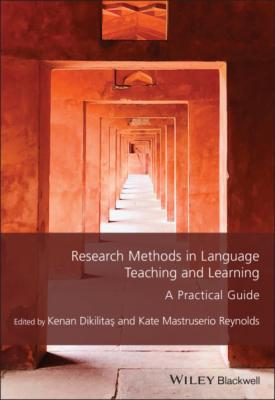Research Methods in Language Teaching and Learning. Группа авторов
Читать онлайн.| Название | Research Methods in Language Teaching and Learning |
|---|---|
| Автор произведения | Группа авторов |
| Жанр | Иностранные языки |
| Серия | |
| Издательство | Иностранные языки |
| Год выпуска | 0 |
| isbn | 9781119701620 |
15 Gage, N. L. (1989). The paradigm wars and their aftermath: A “historical” sketch of research on teaching since 1989. Educational Researcher, 18(7), 4–10. https://doi.org/10.3102%2F0013189X018007004
16 Geertz, C. (1973). The interpretation of cultures: Selected essays. Basic Books.
17 Golombek, P. R. (1998). A study of language teachers’ personal practical knowledge. TESOL Quarterly, 32(3), 447–464. https://doi.org/10.2307/3588117
18 Hammersley, M., & Atkinson, P. (1995). Ethnography: Principles in practice (2nd ed.). Routledge.
19 Henson, R. K. (2001). The effects of participation in teacher research on teacher efficacy. Teaching and Teacher Education, 17(7), 819–836. https://doi.org/10.1016/S0742-051X(01)00033-6
20 Henson, R. K. (2002). From adolescent angst to adulthood: Substantive implications and measurement dilemmas in the development of teacher efficacy research. Educational Psychologist, 37(3), 137–150. https://doi.org/10.1207/S15326985EP3703_1
21 Hiver, P. (2013). The interplay of possible language teacher selves in professional development choices. Language Teaching Research, 17(2), 210–227. https://doi.org/10.1177%2F1362168813475944
22 Holliday, A. (2002). Doing and writing qualitative research. Sage.
23 Katz, S., & Stupel, M. (2016). Enhancing elementary-school mathematics teachers’ efficacy beliefs: A qualitative action research. International Journal of Mathematical Education in Science and Technology, 47(3), 421–439. https://doi.org/10.1080/0020739X.2015.1080314
24 Klassen, R. M., Tze, V. M. C., Betts, S. M., & Gordon, K. A. (2011). Teacher efficacy research 1998–2009: Signs of progress or unfulfilled promise? Educational Psychology Review, 23(1), 21–43. https://doi.org/10.1007/s10648-010-9141-8
25 Kvale, S. (1996). Interviews: Learning the craft of qualitative research interviewing. Sage.
26 Labone, E. (2004). Teacher efficacy: Maturing the construct through research in alternative paradigms. Teaching and Teacher Education, 20(4), 341–359. https://doi.org/10.1016/j.tate.2004.02.013
27 Lincoln, Y., & Guba, E. (1985). Naturalistic inquiry. Sage.
28 Milner, H. R., & Woolfolk Hoy, A. (2003). A case study of an African American teacher’s self-efficacy, stereotype threat, and persistence. Teaching and Teacher Education, 19(2), 263–276. https://doi.org/10.1016/S0742-051X(02)00099-9
29 Mulholland, J., & Wallace, J. (2001). Teacher induction and elementary science teaching: Enhancing self-efficacy. Teaching and Teacher Education, 17(2), 243–261. https://doi.org/10.1016/S0742-051X(00)00054-8
30 Nisbet, J., & Watt, J. (1984). Case study. In J. Bell, T. Bush, & A. Fox (Eds.), Conducting small-scale investigations in educational management (pp. 79–92). Harper & Row.
31 Phan, N. T. T. (2015). Can I teach these students? A case study of Vietnamese teachers’ self-efficacy in relation to teaching English as a foreign language. Unpublished PhD dissertation. The University of Waikato, New Zealand.
32 Pintrich, P. R., & Schunk, D. H. (1996). Motivation in education: Theory, research, and applications. Prentice Hall.
33 Robson, C. (2002). Real world research (2nd ed.). Blackwell.
34 Rushton, S. P. (2003). Two preservice teachers’ growth in self-efficacy while teaching in an inner-city school. The Urban Review, 35(3), 167–189. https://link.springer.com/article/10.1023/A:1025788102188
35 Silverman, D. (2010). Doing qualitative research (3rd ed.). Sage.
36 Stake, R. E. (1995). The art of case study research. Sage.
37 Tschannen-Moran, M., & Woolfolk Hoy, A. (2001). Teacher efficacy: Capturing an elusive construct. Teaching and Teacher Education, 17(7), 783–805. https://doi.org/10.1016/S0742-051X(01)00036-1
38 Tschannen-Moran, M., Woolfolk Hoy, A., & Hoy, W. K. (1998). Teacher efficacy: Its meaning and measure. Review of Educational Research, 68(2), 202–248. https://doi.org/10.3102%2F00346543068002202
39 Wheatley, K. F. (2002). The potential benefits of teacher efficacy doubts for educational reform. Teaching and Teacher Education, 18(1), 5–22. https://doi.org/10.1016/S0742-051X(01)00047-6
40 Wheatley, K. F. (2005). The case for reconceptualizing teacher efficacy research. Teaching and Teacher Education, 21(7), 747–766. https://doi.org/10.1016/j.tate.2005.05.009
41 Wyatt, M. (2000). Making success more likely: Using learner training to build expectancy and self-efficacy beliefs. Unpublished master’s dissertation. University of Edinburgh.
42 Wyatt, M. (2008). Growth in practical knowledge and teachers’ self-efficacy during an in-service BA (TESOL) Programme. Unpublished PhD dissertation. University of Leeds, UK.
43 Wyatt, M. (2009). Practical knowledge growth in communicative language teaching. TESL-EJ, 13(2), 1–23. https://eric.ed.gov/?id=EJ898199
44 Wyatt, M. (2010a). One teacher’s development as a reflective practitioner. Asian EFL Journal, 12(2), 235–261. https://core.ac.uk/download/pdf/52392042.pdf#page=235
45 Wyatt, M. (2010b). An English teacher’s developing self-efficacy beliefs in using group work. System, 38(4), 603–613. https://doi.org/10.1016/j.system.2010.09.012
46 Wyatt, M. (2011a). Becoming a do-it-yourself designer of English language teaching materials. Forum Qualitative Sozialforschung/Forum: Qualitative Social Research, 12 (1), Art 33, 1–38. https://doi.org/10.17169/fqs-12.1.1533
47 Wyatt, M. (2011b). Teachers researching their own practice. ELT Journal, 65(4), 417–425. https://doi.org/10.1093/elt/ccq074
48 Wyatt, M. (2012). Issues in supporting the teaching of reading in English as a second language to Arabic-speaking children. The Reading Matrix, 12(2), 146–162. https://core.ac.uk/download/pdf/52397495.pdf
49 Wyatt, M. (2013a). Overcoming low self-efficacy beliefs in teaching English to young learners. International Journal of Qualitative Studies in Education, 26(2), 238–255. https://doi.org/10.1080/09518398.2011.605082
50 Wyatt, M. (2013b). Motivating teachers in the developing world: Insights from research with English language teachers in Oman. International Review of Education, 59(2), 217–242. https://link.springer.com/article/10.1007/s11159-013-9358-0
51 Wyatt,
